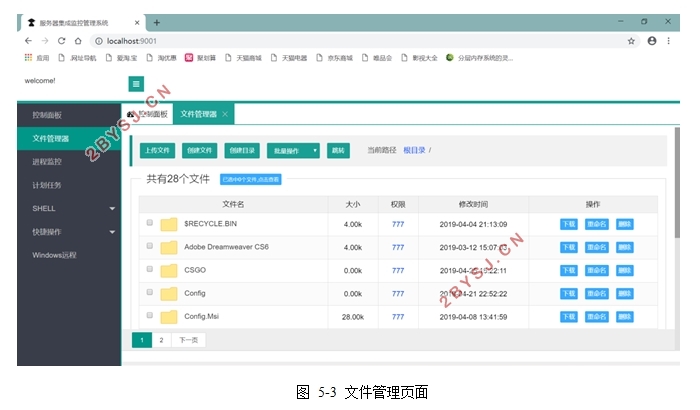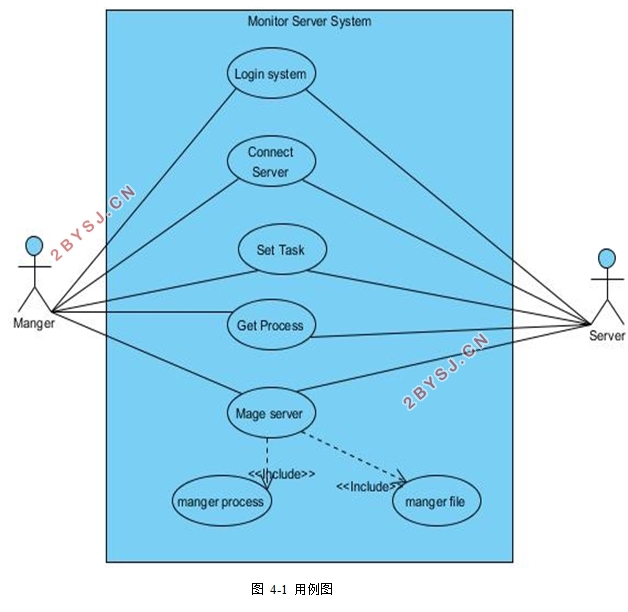多服务器集成监控系统的设计(Python)
无需注册登录,支付后按照提示操作即可获取该资料.
多服务器集成监控系统的设计(Python)(论文12000字,参考代码)
摘要:随着现代信息技术的发展,传统维护方式在管理服务器过程中容易出现错误,从而增加公司的运维成本,很大程度上的影响了企业的运作与发展。为了解决企业传统多服务器运维不便的问题,本文设计并实现了一个能够对多个服务器进行主要资源监控的系统,系统分为两个部分。监控前端使用了layui和jquery技术进行搭建,数据采集端则是由python编程语言进行编写,使用了flask框架。监控系统可以对多个的服务器进行进程监控,以及服务器CPU使用率、内存占用率、 I/O使用状态率以及实时显示网速占用情况等信息进行实时监测。通过集中管理系统对服务器进行监控,不仅可以提高工作效率,同时也在一定程度上保证服务器的安全。经过测试,系统基本满足设计要求,能够对多台服务器进行实时状态监控。
关键词:多服务器监控;服务器预警;数据收集;远程连接;
Design and Implementation of Multi-Server Integrated Monitoring System By Python
Abstract:With the development of modern information technology, the traditional maintenance method is prone to errors in the process of managing the server, thereby increasing the operation and maintenance cost of the company, which greatly affects the operation and development of the enterprise. In order to solve the problem of traditional multi-server operation and maintenance inconvenience, this paper designs and implements a system that can monitor the main resources of multiple servers. The system is divided into two parts. The monitoring front end uses the layui and jquery technologies to build, and the data collection end is written by the python programming language, using the flask framework. The monitoring system can monitor the progress of multiple servers, as well as real-time monitoring of server CPU usage, memory usage, I/O usage status, and real-time display of network speed occupancy. Monitoring the server through a centralized management system not only improves work efficiency, but also ensures server security to a certain extent. After testing, the system basically meets the design requirements and can perform real-time status monitoring on multiple servers.
Key words:Multi-server monitoring; Server Early Warning; data collection; remote connection;


目 录
1 绪论 1
1.1 选题背景和意义 1
1.2 国内外研究进展和现状 1
1.3 论文的研究内容 1
2 相关技术简介 1
2.1 Python编程语言 1
2.2 FLASK框架结构 2
2.3 Visual Studio Code开发平台 2
3 系统需求分析 2
3.1 功能性需求分析 2
3.2 非功能性需求分析 2
4 系统设计 3
4.1 系统功能模型设计 3
4.1.1 用例图 3
4.1.2 用例描述 3
4.2 系统对象模型设计 5
4.2.1 类图 5
4.3 动态模型设计 6
4.3.1 状态图 6
4.3.2 序列图 7
4.3.3 活动图 9
4.4 系统功能设计 10
4.4.1 业务流程模块设计 10
4.5 数据库设计 10
4.5.1 数据表模型 11
4.5.2 数据表关系 11
5 系统功能实现 12
5.1 系统对服务器监测数据的采集 12
5.2 监控数据的汇总展示 13
5.3 系统对服务器信息的分析和预警 14
5.4 系统报警信息的生成 15
5.5 发现报警后的操作 15
5.6 用户可进行的管理操作 15
5.6.1 文件管理操作 15
5.6.2 进程管理 16
5.6.3 集成多主机管理 16
5.6.4 Windows远程界面化控制 16
5.7 用户登录使用时的重要相关界面设计 18
5.7.1 系统登录界面设计 18
5.7.2 系统主页面 19
6 系统测试 21
7 总结与讨论 22
参考文献 23
致谢 24
